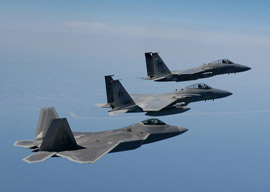
May 31, 2011

“We need to be honest with the president, with the Congress, with the American people” about the consequences of cutting the defense budget, said Secretary of Defense Robert Gates in his valedictory policy address to the American Enterprise Institute.
“(A) smaller military, no matter how superb, will be able to go fewer places and do fewer things.”
Gates seeks to ignite a debate the country seems reluctant to have. With a federal budget running out of balance by 10 percent of gross domestic product, what are we Americans willing to sacrifice? What are we willing to forego? What are we willing to cut?
The biggest budget items are Social Security, Medicare and defense. To Democrats, the first two are untouchables. To most Republicans, defense is off the table. Indeed, the likelihood is that any budget deal to which both parties agree will contain escape clauses to enable Congress to avoid the painful decisions and kick the can up the road.
Consider the situation the U.S. military faces.
The useful life of the planes, ships, missiles, guns and armor that date to the Ronald Reagan buildup of the 1980s is coming to an end, and the cost of replacement weapons is far greater. A fleet of 2,440 F-35 Joint Strike Fighters, for example, will cost over $1 trillion.
Military health care costs have risen 150 percent in 10 years to $50 billion a year. The pay and benefits of today’s forces, which are one-tenth the size of those we deployed in World War II, have seen comparable increases. These costs are eating deeply into the dollars for new weapons systems.
And while we no longer face a Soviet Union with nuclear and conventional forces equal to our own, U.S. commitments have not been reduced but augmented since the end of the Cold War. Six Warsaw Pact nations were brought into NATO, along with three republics of the old Soviet Union.
Meanwhile, the disarmament of Europe continues in the wake of the debt crisis. Of special concern are cuts by the Tory government of Great Britain, our most reliable ally for 70 years.
While the U.S. Army and Marine Corps have been shuttled in and out of Iraq and Afghanistan, China has fought no wars—but grown its defense budget by double-digits annually for two decades.
She now possesses submarines, missiles and aircraft sufficient to challenge the United States in the Western Pacific and is clearly intent on forcing a U.S. strategic retreat from the region.